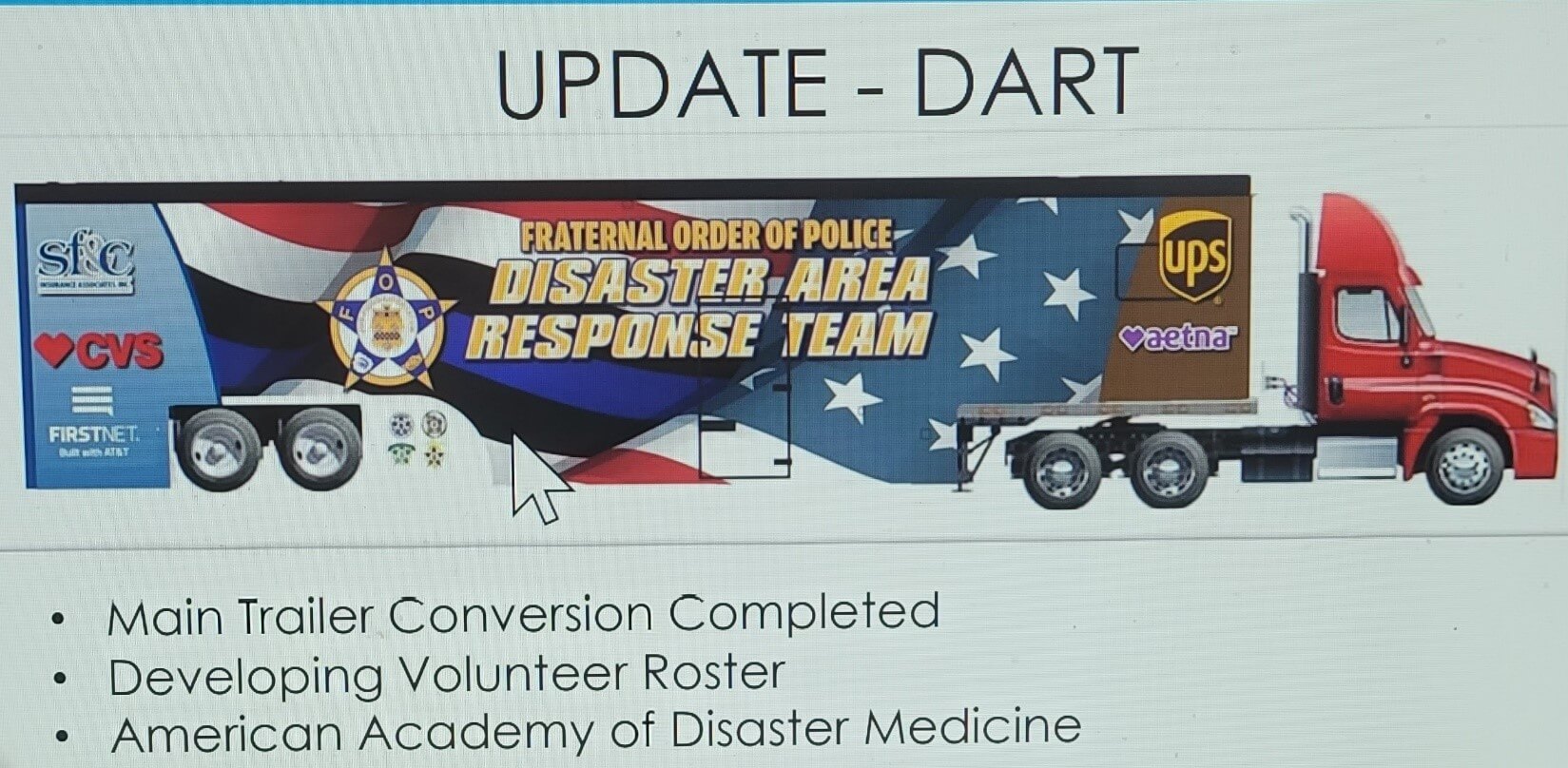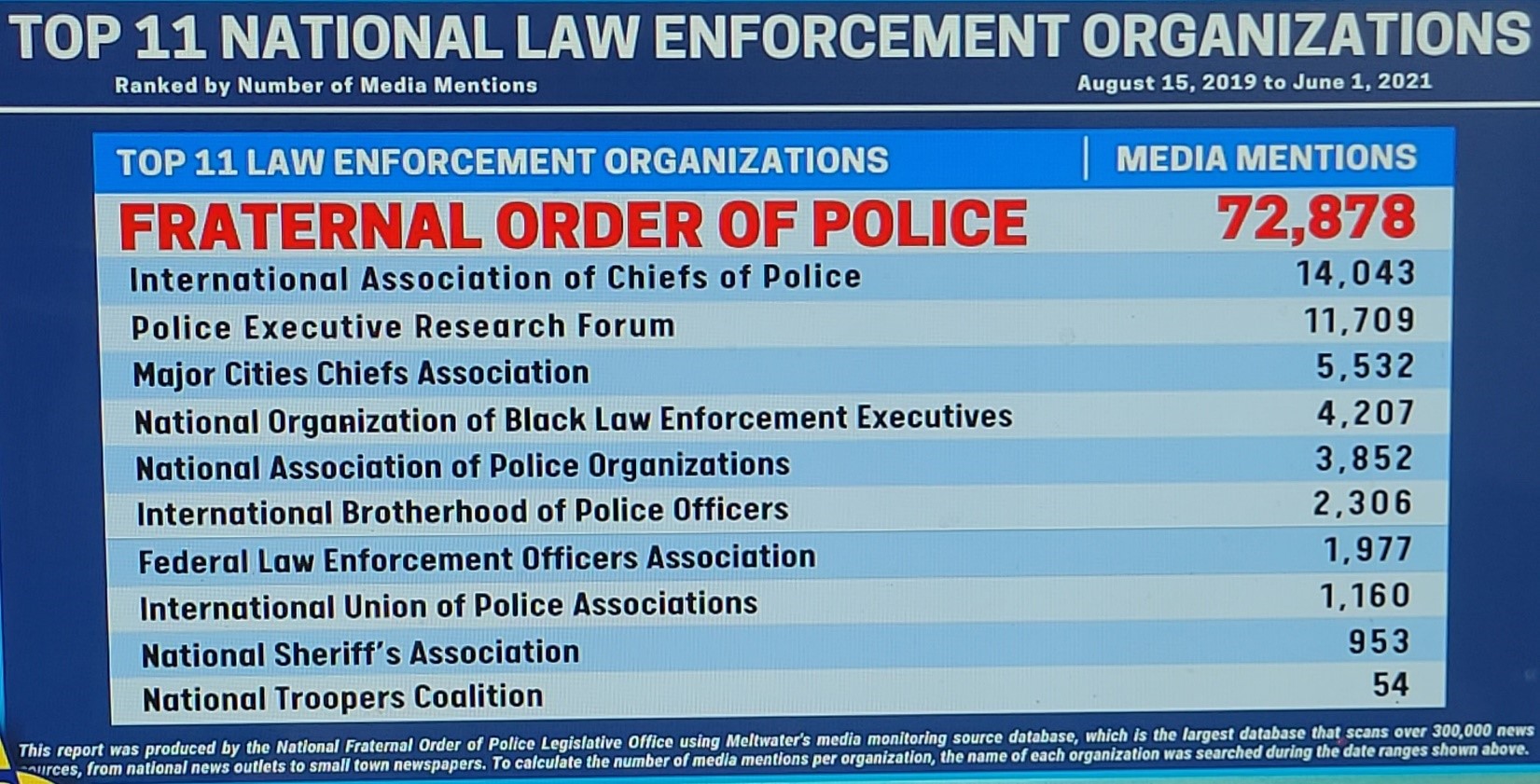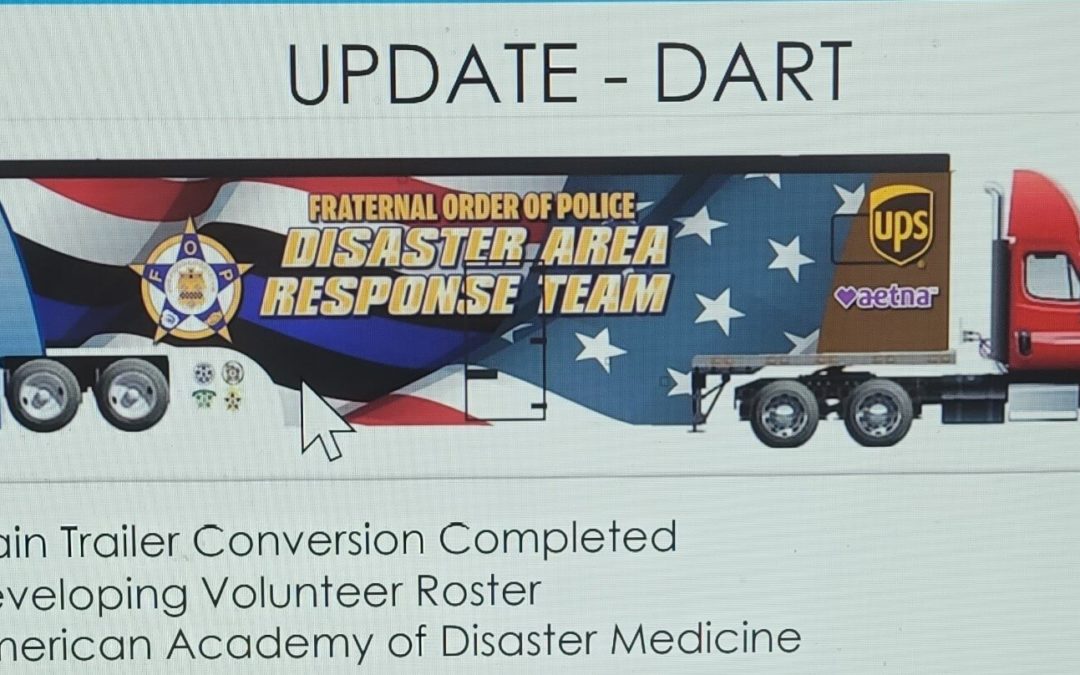Roger Mayberry, President

From The Desk of Larry James
Larry H. James, Esq.
RE: FOP – Columbus Metropolitan Club Forum on Police
- Total number of law enforcement officers.
According to the National Law Enforcement Officers Memorial Fund (NLEOMF) there are about 800,000 sworn officers in the United States. It is unclear if this includes part-time sworn officers.
- Total number of African American officers.
According to the Bureau of Justice Statistics (BJS), in 2016 11.4% of local police officers were Black BJS collects data through a voluntary survey of general-law enforcement agencies. In 2016, 15,322 general purpose law enforcement agencies responded. Of those agencies, 12,261 were local police departments which employed about 468,000 full-time sworn officers.
General-law enforcement agencies include county, municipal, and regional police departments as well as most sheriffs’ offices and primary stare and high patrol offices. BJS does not include sheriffs’ offices with only court and jail duties and it does not include federal law enforcement agencies.
Local police departments are law enforcement agencies that are operated by a unit of local government (town, city, township, or county). It does not include a sheriffs’ office.
- Total number of female officers.
According to the NLEOMF about 12% (96,000) of the 800,000 sworn officers are female.
BJS found that about 12% of full-time sworn officers in local police departments were female.
The FBI also conducts a voluntary survey through the Uniform Crime Report (UCR) Program. In 2019, 13,247 city and county law enforcement agencies responded. Those agencies employed 697,195 sworn officers and 12.8% were female.
- Total number of arrests. Differentiate between Black arrests and White arrests
According to UCR there were 10,085,207 arrests in 2019. When responding to this question, 10,831 agencies provided ethnicity breakdowns. Among those agencies there were 6,816,975 arrests, 69.4% (4,729,290) were White and 26.6% (1,815,144) were Black or African American.
There are three national sources that collect law enforcement employment data: UCR, BJS’ Census of State and Local Law Enforcement Agencies (CSLLEA), and the Census Bureau’s Annual Survey of Public Employment and Payroll (ASPEP). All the information is voluntarily provided by law enforcement agencies. UCR and ASPEP information is updated yearly and CSLLEA is updated every four years. The UCR also collects information on persons arrested and this information is also updated yearly.
2021 Conference training in Indy
Monday, August 16, 2021
Room 101 NFOP Diversity Awareness Training – Robert Gaddy
Room 102 So… You Were Elected to a Leadership Role in the FOP… What’s Next? – Richard Boyd
Room 103 First Response: Autism Awareness Training for First Responders – Sarah Smith and Shannon Swanson
Room 104 Courageous Leadership for Law Enforcement – Travis Yates
Room 105 FOP Legal Defense Plan – Michael Yon
Room 106 Leading Through a Pandemic and a Police Defund: Finding a Path to Move Forward and How
to Apply Technology into the Fight – Rudy Perez
Room 107 Building Financial Strength in First Responder Families – Nick Daugherty
Room 108 Mental Wellness – Sherri Martin
Room 109 Tax Affairs of a Lodge – Bob Krone
Room 110 Policy Changes in a Nation of Police Reform – Leo Blackwell and John Kautzman
Room 116 Responding to Line of Duty Death: Supporting the Family and Co-workers – Dianne Bernhard
Room 117 The Truths of De-Escalation – John Bostain
Tuesday, August 17, 2021
Room 101 NFOP Diversity Awareness Training – Robert Gaddy
Room 102 So… You Were Elected to a Leadership Role in the FOP… What’s Next? – Richard Boyd
Room 103 First Response: Autism Awareness Training for First Responders – Sarah Smith and Shannon Swanson
Room 104 Courageous Communication: Silencing Cowards & Exposing Liars – Travis Yates
Room 105 FOP Legal Defense Plan – Michael Yon
Room 106 Fair Labor Standards Act – Michael Coviello
Room 107 “Not on My Watch”: A LEO’s Guide to Getting Help Confidentially – Carlos Farina, Adam Mogul and Rich Wistocki
Room 108 Mental Wellness – Sherri Martin
Room 109 QuickBooks Training: First Time & Intermediate Users – Izabella Poludniak and Jim Robbs
Room 110 Creating FOP National Retiree Health Insurance Options and the Benefits of the FOP/Aetna
Medicare Advantage Program – Julie DeHaven and Steve Gervasio
Room 116 National Police Weekend 2021 and Police Week 2022 – Dianne Bernhard
Room 117 The Truths of De-Escalation – John Bostain
Wednesday, August 18, 2021
Room 101 Disaster Area Response Team: Being Prepared to Serve Those Who Serve – Jason Smith
Room 102 Creating FOP National Retiree Health Insurance Options and the Benefits of the FOP/Aetna Medicare Advantage Program – Julie DeHaven and Steve Gervasio
Room 103 Robert’s Rules of Order – Rob Pride
Room 104 Courageous Leadership for Law Enforcement – Travis Yates
Room 105 FOP Legal Defense Plan – Michael Yon
Room 106 Leading Through a Pandemic and a Police Defund: Finding a Path to Move Forward and How
to Apply Technology into the Fight – Rudy Perez
Room 107 “Not on My Watch”: A LEO’s Guide to Getting Help Confidentially – Carlos Farina, Adam Mogul and Rich Wistocki
Room 108 Mental Wellness – Sherri Martin
Room 109 Building Financial Strength in First Responder Families – Nick Daugherty
Room 110 Policy Changes in a Nation of Police Reform – Leo Blackwell and John Kautzman
Room 116 Responding to Line of Duty Death: Supporting the Family and Co-workers – Dianne Bernhard
Room 117 The Truths of De-Escalation – John Bostain

The FOP has Medicare Advantage Plan Options
The Fraternal Order of Police (FOP) understands that access to affordable, quality health insurance in retirement is important to you. It is valuable to have information on your plan options. This way you can make an informed decision when you turn 65 or become eligible for Medicare.
Your first step — enroll in Medicare
You must sign up for Medicare during a seven-month window: the three months before your 65th birthday, the month you turn 65, and the three months after your 65th birthday. We recommend signing up early to avoid any gap in health care coverage. To sign up for Medicare, you can apply online at SSA.gov.
Next step — research your plan options
The FOP is offering retired FOP police officers and spouses the option to enroll in a choice of four Aetna Medicare Advantage plans with prescription drug coverage. The FOP plans, which are Medicare Advantage or Part C plans, combine everything covered under Part A (hospital care), Part B (doctor services) and Part D (prescription drugs) into one plan. These plans also include extra benefits not offered by Original Medicare, such as vision and hearing aid reimbursements, the SilverSneakers® fitness benefit and other care and wellness programs.
To be eligible for a Medicare Advantage plan, you have to enroll in Part A and Part B and pay your Part B monthly premiums. Go FOP.AetnaMedicare.com/turning-65 for more information and helpful videos.
Last step — sign up for a plan
Throughout 2021 as you become eligible for Medicare, you can sign up for an FOP Aetna Medicare Advantage plan. Just be sure you’ve already enrolled Medicare Part A and Part B. Then to enroll in an FOP plan, go to FOP.AetnaMedicare.com or call Aetna® at 1-866-246-8060 (TTY: 711), Monday through Friday, 8 AM to 6 PM ET.
More police departments are training officers in de-escalation techniques, but does it work?
Larry James LJames@cbjlawyers.com
https://www.abajournal.com/magazine/article/more-police-departments-are-training-officers-in-de-escalation-techniques-but-does-it-work
NFOP STILL AT THE TOP OF MEDIA HITS



